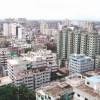Holding Rajuk Accountable: Ministry failed to play its part

Repeated tragic deaths and loss of property in fire and building disasters in the capital could have been averted had the housing and public works ministry as the administrative authority held Rajuk duly accountable for its job, said serving and former top officials.
The ministry is well aware of irregularities and aberrations on the part of Rajdhani Unnayan Kartripakkha (Rajuk) regarding implementation of building laws, development control and the city’s master plan as part of its routine regulatory business, they added.
Besides, the Cabinet Division too remains aware of state of affairs of a government agency.
An administrative authority, for example the public works ministry in this case, being aware of its agencies’ state of affairs files reports and informs the Cabinet Division of it. The division can raise any issue at the cabinet meeting chaired by the prime minister for discussion, query and decision.
That apart, there is theparliamentary standing committee on the ministry which is supposed to regularly scrutinise the decisions, actions and performance of the ministry and its auxiliary agencies like Rajuk.
Former cabinet secretary Ali Imam Majumder said it is mandatory for a ministry as per rules of business to file monthly, quarterly and annual reports to the Cabinet Division on its regulatory role and activities of its subordinate agencies.
Besides, the cabinet secretary may also require any ministry to provide information on any issue of public interest and concern and place it at the cabinet meeting.
“So, isn’t it obvious that repeated building and fire tragedies would not have occurred in the capital had the administrative ministry held Rajuk accountable?” asked the head of an agency under the public works ministry, wishing anonymity.
Md Abu Sadeque, immediate past director of House Building Research
Institute under the ministry, said the ministry has been particularly aware of the building anomalies, as it has been raised at every monthly coordination meeting.
“The ministry has everything in its knowledge,” he said. “Rajuk, however, apparently has not been held accountable.”
At every monthly coordination meeting, the ministry reviews Rajuk’s development planning and regularity actions and what decisions Rajuk board takes every month, said a former Rajuk chairman.
According to the minutes of the public works ministry’s monthly coordination meeting held on March 31 this year, the ministry required Rajuk inspectors and authorised officers to provide information on illegal buildings, building deviations and buildings under construction and what actions Rajuk has taken against errant building owners.
The same minutes say that as part of the ongoing building inspection, 71 percent of 3,897 buildings in eight Rajuk zones were found to have deviated from the approved plans.
Rajuk informed the ministry that a process was on for taking action against only 182 building owners, as per the minutes.
On average, 150 building deviations are detected every month, said the head of yet another agency under the works ministry.
Rajuk makes a summary of all its decisions and places it to the ministry’s monthly coordination meeting. The ministry can direct its auxiliary agencies, question about any issue and make further query.
“So, it is shocking that Rajuk has been going scot-free for decades despite rampant building deviations and disasters, violation of the capital city’s master plan and lax development control,” he said.
National Professor Jamilur Reza Chaudhury said, “Once, an influential real estate developer being elected lawmaker became a member of the parliamentary standing committee on the public works ministry, whose agenda usually is to get his housing project approved by Rajuk.”
The former caretaker government adviser questioned, “How can you expect the committee would hold Rajuk accountable for implementing building regulation and housing laws?”
He went on, “When the country’s highest court refers its verdict for the prime minister’s attention, it means the regular government machineries are not working.”
“Anyway,” added the national professor, “it is a political issue and I don’t want to make a comment.”
Rajuk Chairman Md Abdur Rahman did not respond despite repeated calls and a short message made over his official mobile phone to obtain his version in this regard.
Md Shahid Ullah Khandaker, secretary to the housing and public works ministry, said, “Rajuk is run by a board and all the power is vested in them.”
And Rajuk has its own administrative mechanism like posts of authorised officer, director, member and chairman.
There are hundreds of examples of gross building anomalies like FR Tower and all of those have not been placed to the ministry, he said.
When this correspondent pointed out that the ministry has been informed over the years, he said, “We are only aware of numerical information.
“Rajuk often resorts to hide-and-seek in many cases. They do not take action despite knowing an anomaly; they suppressed the FR Tower anomaly since 2007. We will now look into it.”
When told that the ministry has been aware of what Rajuk has been doing over the years, he said, “If you ask about it this way…”
Over the decades, he then said, there may be some lapses on part of the ministry in holding Rajuk accountable. “But from now on, we will not spare anyone.”
The Daily Star on July 4 contacted Public Works Minister SM Rezaul Karim with a short message over his mobile phone, seeking his response to how his ministry as the administrative authority holds Rajuk accountable for its actions and inactions in the matter of city’s development regulations and building safety.
The minister in his reply said he would respond later.
Having waited for a week, this correspondent contacted him again on July 11 seeking his response. The minister, however, did not respond.
HOW A BUILDING PLAN IS APPROVED
Md Nurul Huda, a former chairman of Rajuk, said the building construction committee either led by a zonal director or a Rajuk board member is enough to approve a building project. All the fivemembers of the committee have to sign to approve a building plan.
In case a building plan is turned down, the applicant appeals to the Rajuk chairman.
Within Rajuk’s routine regulatory role, over 100 building inspectors are responsible for regular inspection and report any building deviation or anomaly to the authorised officers, who are overseen by the Rajuk board members with the chairman at the helm of overall supervision, said Huda.
There are eight zonal directors in Rajuk, responsible for conducting building approval process and overseeing deviations. Two of five Rajuk board members are responsible for overseeing the zonal directors and authorised officers.
Theoretically, each set of officials in the hierarchy is supposed to hold the officials in the lower hierarchy accountable for building deviations and illegal construction, said Huda.
PREVENTION
According to Md Abu Sadeque, former director of House Building Research Institute, the building construction law requires Rajuk to enforce the provision of “building occupancy certificate” after completion of a building.
Without this certificate, water, electricity and gas authorities are not supposed to give connections to a new building.
Rajuk has not enforced the rule over the years, he said. “Building anomalies would have been significantly streamlined had the rule of obtaining occupancy certificate been enforced.”
The situation would not have reached this extent had Rajuk made use of a very powerful Nagar Unnyan Committee, which has been left almost non-functional for the past couple of years.
“These two simple regulatory tools -- occupancy certificate and Nagar Unnayan Committee -- would have made a big difference in streamlining the building aberrations,” he added.

 For all latest news, follow The Daily Star's Google News channel.
For all latest news, follow The Daily Star's Google News channel. 








Comments